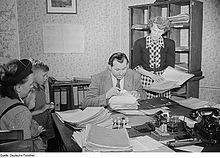clerk

Agent ( English official in charge , clerk are) employee or officer of the higher service or similar eingruppierte workers that a particular, in the editing job description circumscribed work area are entrusted. Their function is the processing of the case (processing of a thing) , which is mostly administrative and / or office work .
General
The division of labor in companies and in the public service ( authorities ) leads in the organizational structure to departments that specialize in a certain subject area . The people in a department who deal with this subject area or a sub-area are called clerks. In terms of labor law, these are employees for whom, according to Section 7 (1) AGG, a gender-neutral form of job posting must be selected ("clerk" or "clerk", "clerk m / f / d").
Clerk handle all transactions of a specified subject area independently within the limits of delegated tasks , skills and responsibilities from. Case processing carries out activities that require thorough, comprehensive specialist knowledge and predominantly independent work . The processing takes place with the help of work equipment and professional competence on the basis of more or less detailed work instructions . An unfinished work or administrative process is processed , which is completed until it is ready for a decision and then until implementation as a market-ready product , service or administrative act . The computerized clerical done via special application software that in some procedural and organizational steps is divided and thus helps the compact working process to be processed. Its highest level is the CAD , in which technical officer a product by EDP construct can. Computer-aided processing enables electronic files that also allow quick access to archived documents.
areas of expertise
The specialist areas of clerks are very diverse. There are clerks in companies in all operational functions , namely in procurement , production , sales , customer service , finance , human resources , information , research and development or logistics . There are also clerks in IT / information technology or in import / export . For banks in particular, which is loan processing is important in insurance the claims administration . Processing that is tailored to the individual case is, from a legal point of view, characteristic of the work of public administration . It is used to develop a decision that is regularly expressed in an administrative act. As a rule, clerks do the tasks in their field of work on their own responsibility .
Functions
The activity of clerks is in most cases a training occupation . However, the clerk is not a profession in the narrower sense, but a functional designation ( professional function ) of an employee who can be deployed in various areas. Examples of professions in which there are clerks are office clerks , accountants , industrial clerks and administrative clerks . In companies and public authorities, with each level “down” in the hierarchy, the scope of the management functions is increasingly displaced by processing elements. But there are also management functions at the clerk level, for example in relation to assistants. Processing does not always have to be an executive activity , because management functions are also performed in the form of the main clerk . Public administrators often act as managers , while clerk in the private sector - except for the main administrator - always design skills perceive.
The processing of cases in public administration is characterized by the legality of administrative action and the requirements of verifiability (Article 19, Paragraph 4 of the Basic Law) and - at least formally - transparency. In public administration, the job title is partly linked to belonging to a certain career group, for example at the lower administrative level ( civil servants in the middle service and employees of comparable pay groups ) and at the ministerial level ( upper service ). Clerks are subordinate to the head of the unit or a speaker . The office clerks are subordinate to them as civil servants of the middle service or higher service or similarly grouped collective bargaining employees.
The functions of the clerks are to be properly assessed according to the requirements associated with them and assigned to offices. A function can be assigned to up to three offices in a career group , and in the highest federal authorities to all offices in a career group. Clerks can be assigned to grades A 9 to A 13 according to their function and seniority . Typical legal status offices and official titles are government inspector , senior government inspector , government officer , government office councilor and government higher office councilor .
Web links
Individual evidence
- ^ Thomas Edeling / Werner Jann / Dieter Wagner (eds.), Knowledge Management in Politics and Administration , 2004, p. 155
- ↑ Jobisjob.de: clerk job profile . Online at www.jobisjob.de. Retrieved August 10, 2015
- ↑ Hartmut Kübler, Organization and leadership in authorities , 1974, p. 47
- ↑ Bernd Beckert / Martin Hagen / Herbert Kubicek, State Initiatives to Promote the Information Society , 2007, p. 220
- ↑ Peter Eichhorn / Peter Friedrich / Werner Jann, Verwaltungslexikon , 2003, p. 925
